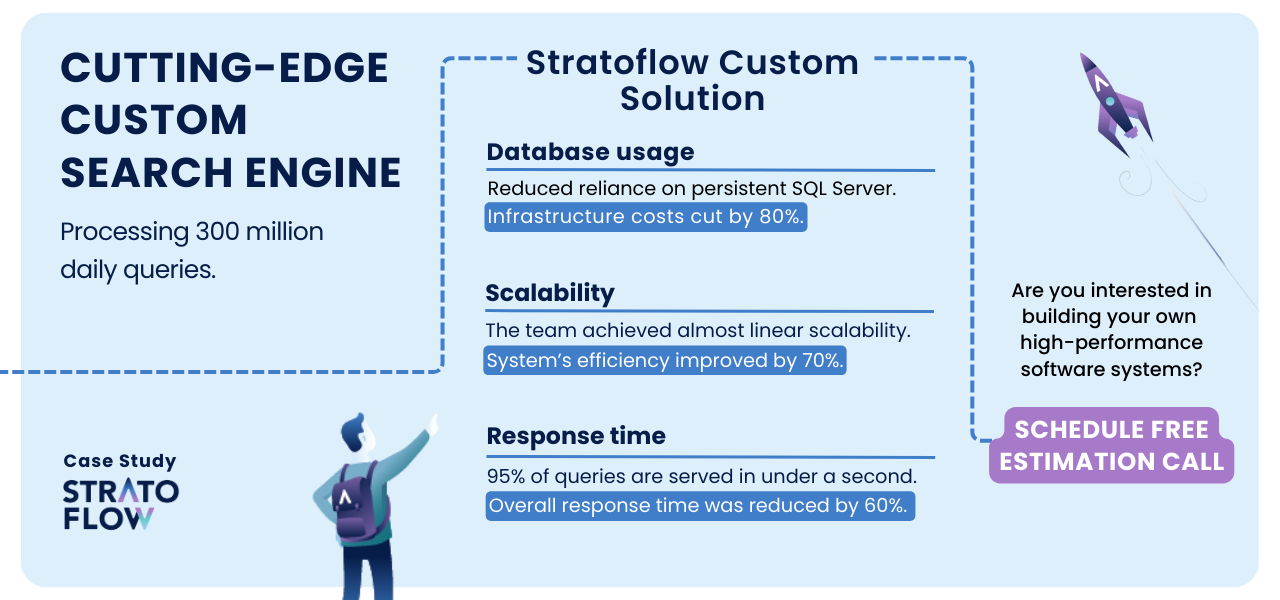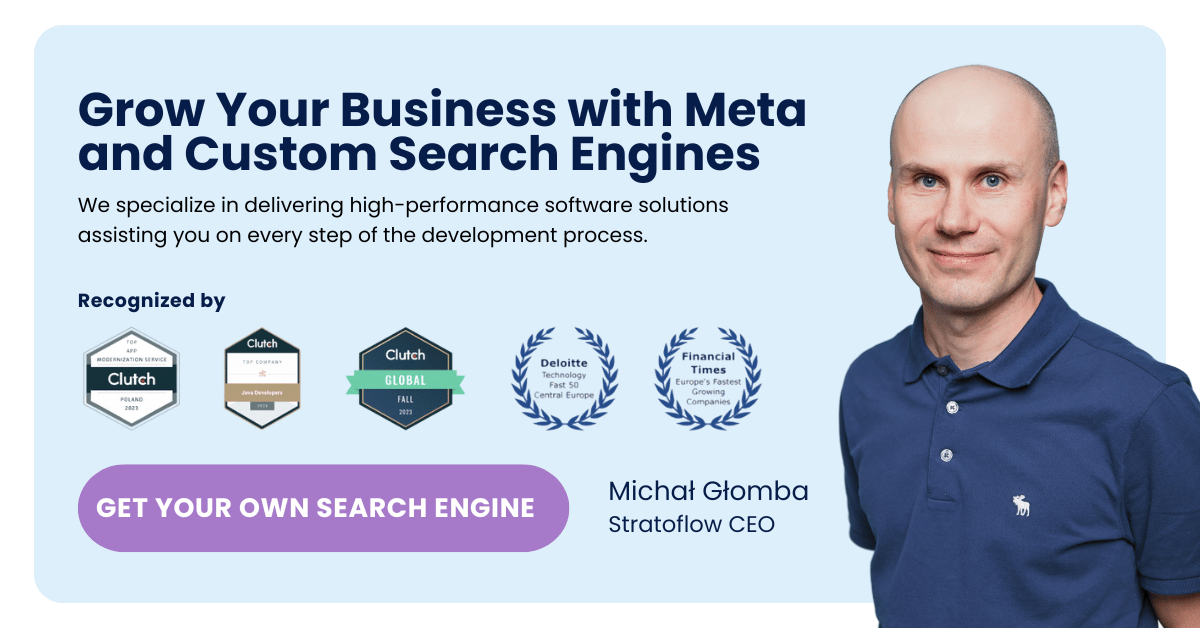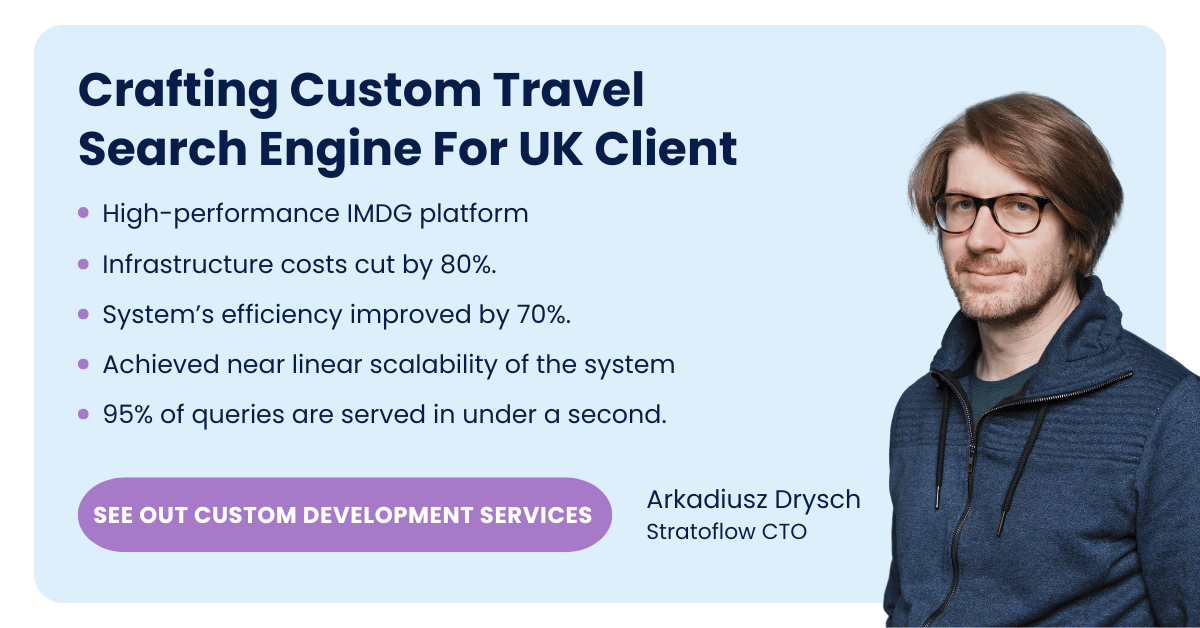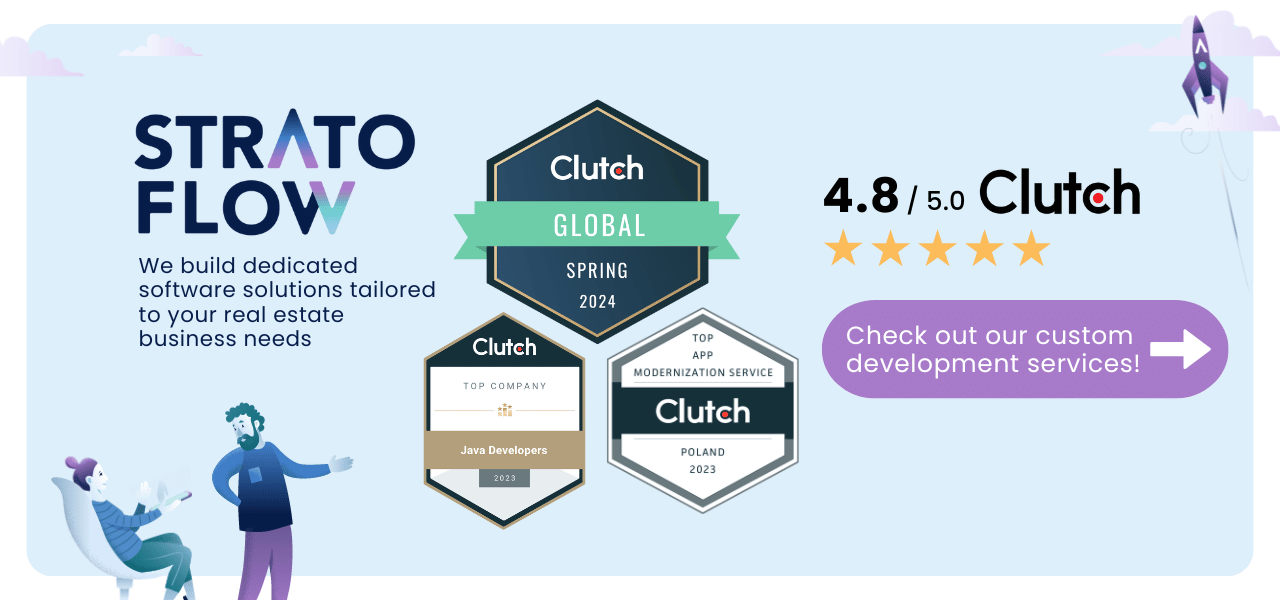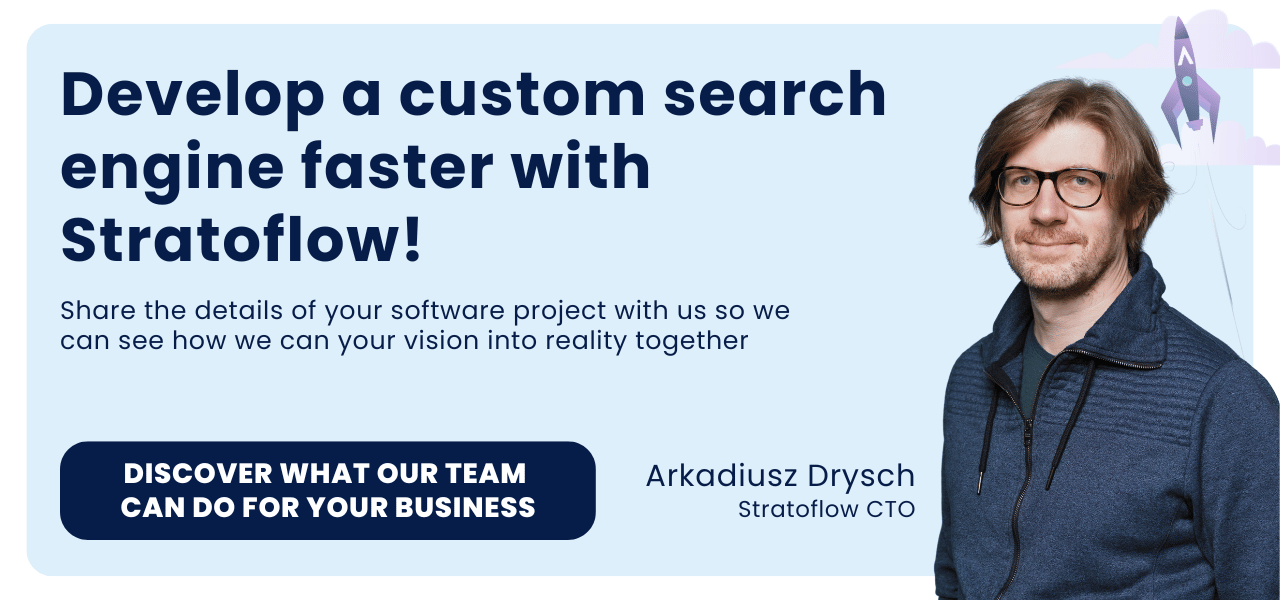
How Can Your Business Use Custom Search Engine to Drive Sales?
Most of us associate the term “search engine” with Google, but these digital tools are absolutely critical to nearly every company that does business online.
Let’s explore the inner workings of search engines, diving into their key components and how they’re used in industries as diverse as travel, e-commerce, real estate, job search platforms, and social media sites.
No matter what type of business you run, a custom search engine will undoubtedly improve how potential customers discover your products and services, giving you a strategic advantage.
What Really are Search Engines?
Search engines and metasearch engines are sophisticated software systems designed to search and retrieve information from the Internet.
They work by crawling and indexing vast amounts of web content, allowing users to enter queries and receive a list of relevant results. At the core of search engines are algorithms that evaluate and rank content based on factors such as keyword relevance, site quality, and user engagement.
These algorithms are constantly evolving to improve the accuracy and relevance of search results. From a business perspective, search engines are critical tools for digital marketing and online visibility.
They enable businesses to reach their target audiences by optimizing content to appear prominently in search results, a practice known as search engine optimization (SEO).
In addition, search engines often monetize their services through paid advertising, where businesses can bid for placement in sponsored listings.
In this way, search engines serve as both powerful information retrieval tools and essential platforms for digital commerce.
What Value Do Search Engines Provide?
Search engines offer their key value by organizing the vast array of web pages and other types of content available online into easily accessible and user-friendly formats.
For users, they simplify the process of finding specific content by delivering relevant information quickly and efficiently.
This is especially valuable at a time when the Internet contains billions of pages, each with varying degrees of quality and relevance. By filtering out irrelevant or low-quality content, search engines save users time and improve their overall online experience.
From a business perspective, search engines are essential tools for reaching and engaging with potential customers.
By optimizing their online presence for search engine algorithms, businesses can improve their visibility and attract more qualified traffic.
This traffic is often more valuable because it is intent driven; users who find businesses through search engines are typically looking for specific products, services or information, making them more likely to convert into customers.
In addition, search engines provide valuable data and insights through tools such as Google Analytics, allowing businesses to refine their marketing strategies and better understand user behavior.
It’s Not Only Google!
Most people associate the term “search engine” with Google, given its dominant presence in the market.
No surprise there.
However, search engines are far more prevalent and diverse than many might think.
They play a critical role in industries as diverse as travel, e-commerce, real estate, insurance and beyond.
In industries such as travel and e-commerce, specialized search engines aggregate data from multiple sources to help users quickly find the best deals on flights, hotels, and products, improving the overall experience and driving sales.
Beyond these familiar examples, businesses of all sizes can use search engine technology to improve their operations.
Developing a custom search engine tailored to your specific industry or business needs can provide a competitive advantage.
For example, an online travel agency (OTA) can develop a custom search engine that allows users to quickly find and compare flights, hotels, and vacation packages based on their specific preferences.
This not only improves the user experience, but also increases engagement and conversions by making it easier for customers to find and book travel options that meet their needs.
That’s exactly what our Stratoflow developers built for a major UK travel client.
We created a highly scalable travel search engine capable of handling over 300 million queries per day, with real-time price and availability calculations.
By moving from a traditional database-oriented architecture to an in-memory data grid solution, we significantly reduced infrastructure costs and increased platform scalability.
As a result, the client was able to handle increased traffic, improve response times, and drive new business opportunities by delivering faster, more reliable search results to their users.
If you’re interested in developing your own custom search engine, contact us to discuss how we can bring your ideas to life. Let’s build something innovative together!
Search Engines Statistics and Insights
As you may have guessed, the role of search and metasearch engines in the digital economy is profound, providing immense value through their extensive reach and advanced capabilities.
Google continues to dominate the global search engine market with 91.7% of all search traffic and an even more impressive 95% on mobile devices.
This dominance translates into approximately 8.5 billion searches per day, with users engaging deeply, spending an average of 10 minutes per visit and exploring 8.6 pages.
Bing is the second largest search engine in the world, with a 3.42% market share and approximately 100 million daily users. Notably, Bing leads the U.S. console market with a 54.68% share, surpassing Google in this specific device segment.
In the travel industry, metasearch engines have become indispensable tools for consumers and businesses alike.
An overwhelming 94% of travelers use search engines to compare hotel rates, underscoring their importance in the decision-making process.
In addition, 60% of independent hoteliers consider metasearch their most effective marketing channel, underscoring its impact on revenue generation.
The economic impact is significant, with metasearch advertising contributing approximately $6 billion in value over the past decade.
The integration of AI into these platforms increases their effectiveness by providing personalized recommendations that are tailored to individual user preferences.
Taken together, these statistics underscore the immense value and influence of both traditional search engines like Google, specialized metasearch platforms, and custom search engines integrated into various web pages in shaping consumer behavior and driving economic outcomes.
How Search Engines Work?
A popular search engine like Google is an incredibly complex system that sifts through massive amounts of data to quickly deliver relevant information.
At a high level, such systems work by continuously crawling the web, storing vast amounts of content, and then using sophisticated algorithms to rank and retrieve that content based on user queries.
The process involves several stages, including crawling, indexing, and querying, each of which is essential to providing accurate and efficient search results.
Custom search engines follow similar principles, but can be tailored to meet specific needs, providing greater control over data sources, user experience, and search functionality.

Web Crawlers
Web crawlers, also known as spiders or bots, are automated programs that systematically crawl the Web to discover and collect content from different Web sites.
These crawlers follow links from page to page, collecting data that is processed and stored in the search engine’s database.
In custom web search engines, crawlers can be designed to target specific types of content or websites, ensuring that the most relevant and up-to-date information is captured for the search engine’s users.
Tech stack
When building web crawlers and the entire search engine infrastructure, selecting the right technology stack is crucial.
A Java-based stack is often preferred due to its robustness and extensive ecosystem. Here’s an example of a tech stack for developing a custom web crawler and search engine:
- Java: Core programming language for developing the web crawler.
- Spring Boot: For building the web application and managing dependencies.
- Apache Nutch: A scalable web crawler framework that works well with Hadoop.
- Apache Lucene: A powerful search library that provides indexing and search capabilities.
- Apache Solr or Elasticsearch: For handling the search server, indexing, and querying large volumes of data.
- MySQL or PostgreSQL: For structured data storage and managing relational data.
- Apache Kafka: For managing real-time data streams and handling the communication between the crawler and the indexing system.
- Docker: To containerize applications, ensuring consistency across different environments.
- Kubernetes: For orchestrating and managing containerized applications at scale.
- AWS or Google Cloud Platform: For cloud-based infrastructure, offering scalability and reliability.
Tips from experts
Drawing from our extensive experience in building custom search engines for clients, we’ve gathered some key tips for working with web crawlers:
- Efficient Scheduling: Ensure your crawler is efficiently scheduled to avoid overloading websites and to adhere to the robots.txt directives. Implementing a polite crawling policy helps maintain good relationships with site owners.
- Scalability and Fault Tolerance: Design your crawler to be scalable and fault-tolerant. Using distributed systems and cloud-based infrastructure can help handle large volumes of data and ensure high availability.
- Content Deduplication: Implement algorithms to detect and remove duplicate content early in the crawling process. This reduces unnecessary storage and processing, leading to more efficient indexing.
- Adaptive Crawling: Develop crawlers that can adapt to changes in website structures. This can be achieved by incorporating machine learning models that recognize and adjust to different patterns in web page layouts.
- Compliance and Ethics: Always ensure that your crawling activities are compliant with legal and ethical standards, including respecting copyright and data privacy regulations.
By following these guidelines, you can develop a web crawler that is not only powerful but also efficient and reliable, forming a solid foundation for your custom search engine.
Database
Another important part of search engines is the database.
This is where all the collected content is stored after it has been collected by the web crawlers.
This includes web pages, documents, images, and other forms of data. In a custom meta search engine, the database can be optimized to store only the most relevant data, reducing storage requirements and improving retrieval times.
Advanced databases can use distributed systems or cloud-based storage to handle large volumes of data, ensuring that the search engine can scale as your needs grow.
What to look out for
When designing the database for a custom search engine, it’s important to prioritize scalability and performance.
As the volume of data and the number of queries grow, the database must be able to handle the increased load without compromising speed or accuracy.
One effective approach is to use an in-memory data grid, which allows faster data retrieval by storing frequently accessed data in memory rather than on disk.
This approach was successfully implemented in our case study for a major UK customer, where it significantly improved scalability and reduced infrastructure costs.
An in-memory data grid, such as Apache Ignite or Hazelcast, distributes data across multiple nodes in memory, enabling parallel processing and reducing latency.
This setup is particularly beneficial for search engines that need to handle real-time queries and updates, ensuring that users receive current and relevant information almost instantaneously.
Tips from experts
Our Stratoflow developers have compiled a set of best practices and technical advice to optimize the performance and reliability of your database infrastructure.
- Optimize Data Storage: Use efficient data compression and schema design to minimize storage needs and maximize retrieval speed.
- Use Replication Wisely: Implement asynchronous replication to ensure high availability without compromising performance.
- Leverage Caching: Store frequently accessed data in-memory to reduce database load and improve response times.
- Plan for Data Growth: Ensure your architecture is scalable to handle increasing data volumes and queries.
- Monitor Performance: Regularly track key metrics like query latency and memory usage to identify and resolve bottlenecks early.
Security and Data Integrity
Ensuring the security and integrity of the data stored in the database is paramount.
This involves implementing strong encryption for data at rest and in transit, securing database access with multi-factor authentication (MFA), and regularly updating the database software to protect against vulnerabilities.
Additionally, regular backups and disaster recovery plans should be in place to safeguard against data loss, ensuring that the search engine can quickly recover from any unforeseen incidents.
Indexing Algorithm
The indexing algorithm is responsible for organizing the data stored in the database so that it can be quickly retrieved when a search query is made.
It does this by analyzing the content and creating a structured index that links keywords and phrases to specific documents or pages.
In custom search engines, the indexing algorithm can be fine-tuned to prioritize certain types of content, adjust for specific linguistic nuances, or apply filters that meet the needs of the business or user base.
Algorithm Customization and Tuning
In addition to general best practices, it’s critical to customize and fine-tune the indexing algorithm based on the specific needs of your search engine.
This may include adjusting weighting factors for certain types of content, incorporating user feedback to refine relevance scoring, or incorporating machine learning models to adapt to evolving user behavior.
Customization ensures that the algorithm is aligned with the unique goals of your business or application and delivers the most relevant and accurate results possible.
Tips from experts
Developing and refining an indexing algorithm requires careful consideration of various factors to ensure optimal performance and relevance.
Here are some expert tips to guide the process:
- Prioritize Relevance Scoring: Implement sophisticated relevance scoring techniques that consider factors such as keyword frequency, document popularity, and user behavior to rank search results effectively. It is they foundation of different search engines.
- Optimize for Speed: Use efficient data structures like inverted indexes to speed up the search process. Compressing the index can also reduce memory usage and improve performance.
- Handle Large-Scale Data: Design your algorithm to scale horizontally, allowing it to handle large volumes of data and queries without degrading performance.
- Incorporate Semantic Search: Enhance the algorithm with natural language processing (NLP) techniques to understand the context and meaning behind user queries, improving the accuracy of search results.
Search Result Page
The search results page is what the user interacts with after submitting a query.
It displays the most relevant search engine results based on the indexed data and ranking algorithms. In a custom search engine, this page can be tailored to provide a unique user experience, with options for filtering, sorting, and displaying results in formats that are most useful to the audience.
Most popular search engines offer additional features such as autocomplete, related searches, and personalized results that can further enhance the user’s interaction with the search engine.
Must-have features
When designing a SERP, certain features are essential to provide a seamless and effective user experience:
- Search Filters and Sorting Options: Allow users to refine their search results by categories, date, relevance, or other criteria to quickly narrow down to what they are looking for.
- Autocomplete and Suggestions: Implement real-time search suggestions and autocomplete features to assist users in formulating their queries more efficiently.
- Rich Snippets: Display additional information such as images, ratings, and summaries directly within the search results to provide users with a preview of the content.
- Pagination or Infinite Scroll: Depending on the context, choose between traditional pagination or infinite scroll to manage how results are displayed without overwhelming the user.
- User Feedback and Personalization: Integrate features that allow users to provide feedback on the relevance of search results, and use this data to personalize future queries.
Tips from experts
Drawing from our extensive experience in developing custom search engines, here are some expert tips for optimizing the SERP for usability and user experience (UX):
- Focus on Speed: Ensure that the SERP loads quickly, even with large volumes of data, to minimize user frustration and improve engagement.
- Keep it Simple: Avoid cluttering the page with too many elements. A clean, minimalistic design helps users focus on the search results themselves.
- Make it Responsive: Design the SERP to be fully responsive, ensuring it works seamlessly across different devices and screen sizes.
- Highlight Relevant Information: Use visual hierarchy techniques to emphasize the most relevant information within search results, such as bolding keywords or using contrasting colors.
- Test and Iterate: Regularly conduct user testing to gather feedback and make iterative improvements to the SERP layout and features.
Do you want to introduce your won custom search functionality in your business?
Get your own custom search engine
How Search Engines are Used?
Custom search engines are incredibly versatile tools used across various industries to improve user experience, streamline operations, and enhance data accessibility. They enable businesses to provide tailored search functionalities that meet specific needs, making them invaluable in sectors ranging from e-commerce to travel. By leveraging the power of search engines, companies can optimize how they present information, helping users find what they are looking for more efficiently.
Travel and Accommodation Options
In the travel and accommodation industry, companies like Airbnb, Booking.com, and Trivago rely heavily on custom search engines to manage vast amounts of data and deliver precise search results to users.
These platforms utilize search engine pages that allow users to input search queries for specific dates, locations, and preferences.
The leading search engines on these sites are designed to filter and sort through thousands of listings in real-time, providing users with the most relevant options.
Airbnb, for example, uses a custom search engine to help users find accommodations that match their criteria, such as location, price, and amenities.
Booking.com and Trivago go a step further by integrating meta-search engines, which aggregate results from multiple sources, allowing users to compare prices and availability across different platforms.
These travel search engines act as powerful tools to connect travelers with the most suitable options, improving user satisfaction and driving conversions.

Value for Travel Industry
Leveraging search engines in the travel industry offers several advantages:
- Enhanced User Experience: Custom search engines provide personalized results, improving the overall user experience by delivering relevant listings quickly.
- Increased Conversion Rates: By allowing users to refine their search queries and find exactly what they need, search engines help increase booking conversions.
- Time and Cost Efficiency: Meta search engines streamline the search process by aggregating data from multiple sources, saving users time and helping them find the best deals.
- Data-Driven Insights: Analyzing search engine page interactions and queries allows companies to gather valuable insights into customer preferences and behavior.
By effectively utilizing search engines, companies in the travel industry can stay competitive, offering users a seamless and efficient way to find and book their ideal travel experiences.
[Read also: Hotel Metasearch Engines: Key Examples And Custom Solutions]
E-Commerce and Product Discovery
Custom search engines play a pivotal role in e-commerce, driving the discovery of products and enhancing the overall shopping experience.
As online shopping continues to dominate, platforms like Amazon, Shopify, and other major e-commerce sites rely heavily on search engines to help users find products quickly and efficiently. These search engines are often highly personalized, leveraging user data to display the most relevant results, which increases customer satisfaction and boosts sales.

Personalizations and search engines
Personalization is at the heart of e-commerce search engines.
According to recent data, 74% of e-commerce companies have implemented some form of site personalization, which is key to delivering a tailored shopping experience.
This personalization goes beyond simple product recommendations to influence search results, email marketing, and even site navigation.
In addition, 76% of consumers are more likely to purchase from brands that personalize their interactions, underscoring the importance of a robust search engine in the ecommerce landscape.
E-commerce search engines also incorporate features such as dynamic re-ranking, which continually optimizes search results based on user behavior and preferences. This ensures that users see the most relevant products at the top of their search results, further enhancing their shopping experience.
Value for E-Commerce Industry
Implementing a custom search engine offers significant advantages for both e-commerce store owners and their customers:
- Improved Product Discovery: Search engines enable users to quickly find what they’re looking for, increasing the chances of conversion and reducing the time spent browsing.
- Enhanced Personalization: By leveraging search history and user behavior, search engines can deliver personalized product recommendations, leading to higher engagement and sales.
- Increased Customer Satisfaction: When users can easily find relevant products, their overall satisfaction with the shopping experience improves, leading to repeat business.
- Higher Conversion Rates: Custom search engines that offer refined search queries and filtered results can significantly boost conversion rates by presenting users with precisely what they need.
- Valuable Data Insights: Search engines generate a wealth of data on user behavior, which can be used to optimize marketing strategies, product offerings, and overall store performance.
- Scalability: E-commerce platforms can scale their search engine capabilities to handle increasing traffic and a growing product catalog without compromising performance.
Real Estate Market
In the real estate market, custom search engines are essential tools for helping users navigate the vast array of listings available online.
Leading platforms such as Zillow, Realtor.com, and Redfin use sophisticated metasearch engines that allow users to filter properties by location, price, size, and other specific criteria. These platforms effectively function as the most popular search engines within the real estate industry, making it easier for buyers, sellers, and agents to connect and transact.
These search engines are designed to scour the World Wide Web of real estate listings, aggregating data from multiple sources to present users with comprehensive and up-to-date information.
By providing detailed filters and search options, these platforms help users quickly narrow down their choices, increasing the efficiency and effectiveness of the real estate search process.

Value for Real Estate Industry
For the real estate industry, having a leading search engine is not just about connecting buyers with sellers; it’s about creating a platform that delivers a seamless, efficient, and satisfying user experience.
- Enhanced Property Discovery: Various search engines in the real estate market help users find properties that match their specific needs, reducing the time and effort involved in the search process.
- Improved User Experience: Custom search engines provide a smooth, intuitive interface that makes it easier for users to navigate large databases of property listings.
- Higher Engagement: By offering features like saved searches, alerts, and personalized recommendations, search engines increase user engagement and retention on real estate platforms.
- Comprehensive Data Access: Search engines aggregate data from multiple sources, giving users access to a broad spectrum of property information, including price trends, neighborhood details, and market comparisons.
- Optimized Lead Generation: Real estate platforms can use search engines to track user behavior and preferences, helping agents and sellers generate more targeted leads.
Job Search Platforms
Job search platforms such as LinkedIn, Indeed, and Glassdoor rely heavily on search engines to connect job seekers with potential employers.
These platforms use different search engines tailored to help users filter job listings based on various criteria such as location, industry, experience level, and salary. By optimizing web search capabilities, these platforms make it easier for users to find job opportunities that match their skills and preferences.
Today, the use of search engines on job sites is central to the job search process.
These search engines gather and organize data from across the Web and present users with relevant job listings and company information. Search engine results on these platforms are often personalized, showing job seekers listings that match their profile and past searches.
This not only streamlines the job search process, but also increases the chances of finding the right job.

Value for Job Search Industry
Using search engines in job search platforms provides several key benefits:
- Targeted Job Matching: Different search engines allow users to filter job listings by specific criteria, helping them find opportunities that closely match their skills and career goals.
- Increased Accessibility: Web search functionalities enable job seekers to access a wide range of listings from various sources, all aggregated in one place.
- Enhanced User Experience: By providing intuitive search options and personalized search engine results, job platforms make the job search process more efficient and less overwhelming.
- Data-Driven Insights: Platforms can use search data to offer insights into job market trends, salary benchmarks, and demand for specific skills, helping both job seekers and employers make informed decisions.
- Improved Engagement: Features like saved searches, job alerts, and recommendations based on past searches increase user engagement and ensure that candidates stay updated with relevant job opportunities.
Social Media Sites
As the last item on our list, social media sites represent a unique application of custom search engines, playing a vital role in how users interact with content and each other online.
Platforms like Facebook, Instagram, and LinkedIn use sophisticated search functionalities to help users find friends, groups, posts, and relevant content across the web. These search engines are not just tools for finding content but are also integral to delivering personalized experiences.
The personalization of search results on social media is driven by data and algorithms that consider a user’s past interactions, preferences, and social connections.
In 2023, it was found that 97% of business leaders believe that AI and machine learning will further enhance the ability to analyze social media data for improved search and personalization functionalities. This trend reflects the growing importance of using search engines not just for finding content, but for curating a personalized social media experience that keeps users engaged.
Value for Social Media Industry
Search engines on social media platforms offer significant benefits:
- Enhanced Content Discovery: Different search engines within social platforms help users find specific content, people, and trends, making the web search more efficient and engaging.
- Personalized Experiences: By analyzing user behavior and preferences, social media search engines deliver personalized search results, increasing user satisfaction and retention.
- Improved User Engagement: Features like hashtag searches and trending topics keep users engaged by highlighting relevant and popular content.
- Data-Driven Insights: Social media platforms can leverage search data to understand user interests and behavior, informing content strategies and advertising approaches.
- Scalability and Performance: As social media platforms grow, their search engines must scale to handle vast amounts of data and user queries without compromising performance.
Related Posts
Thank you for taking the time to read our blog post!

